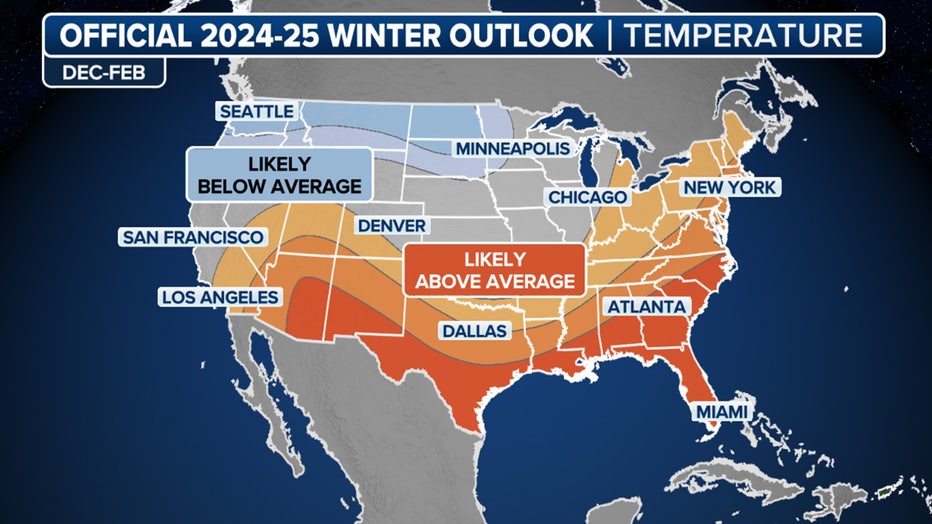Winter outlook: La Nina expected to emerge ahead of country's coldest season

A man sleds down a snow covered hill in Houston, Texas on Feb. 15, 2021. (Photo by Mark Felix / AFP) (Photo by MARK FELIX/AFP /AFP via Getty Images)
Winter will be here before we know it, and the emergence of a La Niña weather pattern could have an impact on the types of winter weather conditions we see in the U.S.
NOAA’s Climate Prediction Center (CPC) released its official winter outlook for 2024-25 on Thursday and broke down different temperature and precipitation trends for the upcoming season, as well as expected changes to drought conditions across the country.
CPC forecasters said they still expect a La Niña to develop during the fall and play a role in temperatures and precipitation trends across the country. However, the La Niña that develops will likely be weak and short-lived, forecasters said.
Generally, a La Niña pattern means wetter and cooler weather for the northern tier of the U.S. and warmer, drier weather across the southern tier. That seems to fall in line with what CPC forecasters predict for the winter.
Temperature outlook

This graphic shows the temperature outlook for the 2024-25 winter season.(FOX Weather)
The winter weather outlook is favoring above-average temperatures for most of the U.S. from the Southwest eastward to include most of the central U.S., as well as all of the eastern U.S. from the Southeast through the mid-Atlantic into the Northeast and New England.
"We've got some warmer temperatures that are still going to be in play down to the south, but maybe not as much when you get to the northern part of the Great Lakes, FOX Weather Meteorologist Bob Van Dillen said. "Because we think that this is the La Niña that's going to develop, it's going to be a little weaker and a little shorter-lived."
WHAT ARE EL NIÑO AND LA NIÑA CLIMATE PATTERNS?
The Gulf of Mexico is also expected to remain warm.
"That will keep your temperatures across the Gulf Coast on the warm side, including all the way out toward the Atlantic side of Florida, Van Dillen continued.
The CPC said there’s also a likelihood of above-average temperatures for northern Alaska, while below-average temps are likely for southern parts of the state.
FARMERS ALMANACS ISSUE DUELING WINTER OUTLOOKS: ‘GENTLER’ OR ‘WHIRLWIND’?
Precipitation outlook

This graphic shows the precipitation outlook for the 2024-25 winter season.(FOX Weather)
The seasonal precipitation outlook from the CPC shows enhanced probabilities of below-average totals along most of the southern tier of the country from the Southwest through the southern Plains, along the Gulf Coast and into the Southeast.
"This winter, an emerging La Niña is anticipated to influence the upcoming winter patterns, especially our precipitation predictions," said Jon Gottschalck, chief of the Operational Prediction Branch of the Climate Prediction Center.
The CPC said parts of southeastern Alaska and the Alaska Panhandle, may see below-average precipitation totals this winter.
WILL LA NIÑA ARRIVE IN TIME FOR WINTER?
However, the CPC said the greatest chances of below-average precipitation are expected in the Southwest and southern Plains.
Chances of above-average precipitation this winter are expected in parts of the Pacific Northwest, the northern Rockies, parts of the Great Lakes region and western and northern Alaska.
"Also, major northeast cities are likely to see average snowfall or below yet again," Van Dillen said. "So, probably most likely below. So, if you want a big blockbuster snowfall maker in New York City, go back to 1995 to 1996. That was a weak La Niña."
FARMERS’ ALMANAC WINTER OUTLOOK CALLS FOR ‘COPIOUS AMOUNTS OF SNOW, RAIN, SLEET AND ICE’
Drought outlook

This graphic shows the the drought outlook through Jan. 31.(FOX Weather)
Drought conditions in the U.S. will also be a concern through at least the end of January. The CPC has highlighted much of the southern tier of the country for a drought that persists or even expands.
A large swath of the country from the Southwest through the Plains, Deep South and parts of the Great Lakes region is likely to see their drought persist.
The CPC said it expects drought to develop in additional areas of the Southwest, such as the Four Corners region, as well as parts of the Southeast.

